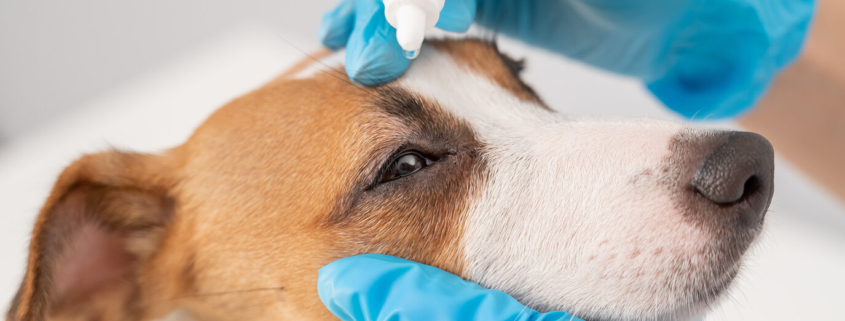Treating Dog Eye Inflammation
A swollen eye on your dog might look frightening – however, there are many reasons why your dog might suffer from eye inflammation. It is treatable from injuries to allergies – no matter the actual cause of your dog’s eye inflammation. Here is everything you need to know about treating your pet’s eyes and how you can prevent future inflammation.
What Is Dog Eye Inflammation?
Also known as idiopathic blepharitis, Anterior uveitis or Eye inflammation in dogs is a painful condition in which the eye becomes reddened, swollen, and inflamed. The surrounding flesh and the eyelid can swell up and become warm to the touch. Inflammation of the eye can be a condition on its own, or it could be a sign of something more serious. Blepharitis is typically the result of allergies, an infection, an injury, various tumors, underlying disease, or a congenital abnormality. While inflammation might heal over time, it can be severe and should be assessed by a vet. If you suspect something is wrong with your dog’s eye, it is vital to seek medical attention as soon as possible, as inflammation is often a sign that there could be a deeper underlying cause.
What Causes Dog Eye Inflammation
There are many reasons why your dog might be experiencing inflammation around the eyes. It is essential to have your pet assessed by a veterinarian to establish the cause of the inflammation – as it can be a symptom of something a little more serious, you should take any inflammation seriously.
Reasons Why is my dog’s Eye Inflamed?
- Rapid formation of cataracts
- Underlying health conditions – autoimmune disease, diabetes, parasitic disease, Bacterial, viral or fungal infection, Lyme disease, adenovirus, distemper, canine herpes
- Allergies – Hay fever and a change of season are common causes of eye inflammation in dogs. Chemicals such as laundry detergent or cleaning products used around the house can also contribute to inflammation.
- Corneal abrasion or corneal ulceration – abrasions of the cornea resulting from trauma, infection, or dirt trapped under the eyelid can cause eye swelling.
- Cancer – Mast cell tumors and cancers can cause eye inflammation in dogs.
- Adverse reactions to medical treatments or conditions such as bee stings can result in blepharitis in dogs.
- Traumatic injuries – An injury such as blunt trauma or penetration of the eye causing an issue like lens damage
- Congenital abnormalities – Your dog’s eye inflammation could result from congenital disabilities such as eyelid abnormalities. Hair and prominent facial folds, a lack of hair and eyelashes, sensitive skin, or abnormalities in how the eye functions can cause an increased risk of inflammation around the eyes.
- Sunburn – some dog breeds are particularly susceptible to inflammation around the eye. Dogs with white fur or short coats can often experience sunburn around the eyes if not adequately protected.
Signs and Symptoms of Eye Inflammation in Dogs
As blepharitis in dogs can be very irritating, you will likely notice it when it occurs. There are several different symptoms and signs of blepharitis. Look out for these signs.
What does eye inflammation look like in dogs?
- Blinking – excessive blinking and squinting
- Hypersensitivity to light – bright lights might irritate your dog’s eye
- Reddening – any areas of white around the eye may become red and swollen
- Eye Discharge -Tearing, watery eyes or a discharge that varies in texture might be seen dripping down at the corners of the eyes
- Frequent touching and pawing at the eye
- Blood – There may be bleeding within the eye or in the surrounding flesh
- Flaky or scaly skin – This symptom might not be present in all cases; however, inflammation can cause the skin to break or become dried out and scaly. Flaky skin can result from an adverse reaction to the medication, highlighting a possible cause of the inflammation itself.
- Shape and color of the eye – The eyeball and the iris may change color or shape
- Swelling – The eyeball and surrounding flesh may swell up and become puffy
- The appearance of the affected eye – Your dog’s eye may look cloudy, appear dull or even look milky or blue
Eye diseases, viral infections, and many other conditions may cause blepharitis in dogs. Each symptom and sign will be taken into consideration by a vet before a diagnosis is given. If you do notice something is wrong, take notes of the symptoms and offer your vet an in-depth description. This could help your veterinarian diagnose your pet accurately for a speedy treatment plan.
Diagnosis of Eye Inflammation in Dogs
Diagnosing eye inflammation in dogs is often a simple process for a vet. Your pet’s eye is a vital organ, and it needs to be protected and cared for – which makes it even more important to have it assessed as soon as possible. Your vet can diagnose the cause of your dog’s eye inflammation and the underlying cause. Diagnostic tests can vary in type and depth –
- Physical examination – diagnosis often starts with a physical inspection of the eye and the surrounding tissues as inflammation can result from many different reasons; your vet may do a complete body examination and the initial eye exam.
- Review of the complete medical history – Recurrent inflammatory disorders can cause inflammation in the eye – a review of your pet’s previous history may pinpoint the cause of the inflammation.
- Schirmer Tear Test – If your dog suffers from hereditary or genetic conditions, your vet may suggest a Schirmer tear test to see if your dog’s eyes have adequate tear production and produce enough moisture. Tear duct problems can contribute to acute swelling of the eye.
- Dye testing – Testing such as fluorescein staining can help pinpoint corneal injuries that could cause your dog blepharitis. This will also determine whether your pet’s cornea is not damaged.
- Ocular pressure testing will help your vet determine whether your pet is suffering from glaucoma or uveitis.
- Complete blood count panels – inflammation can be caused by bacterial infections or underlying parasites; if your vet suspects a different cause, they might recommend a full blood panel.
As inflammation is often a symptom of something more profound, your vet needs to rule out as many conditions as possible. Further testing, such as allergy testing, and Further testing, may be needed if an infection occurs, or to form an appropriate treatment plan.
Treatment of Eye Inflammation in Dogs
A variety of conditions can cause blepharitis, and each of these conditions is treated differently. Since this condition can be challenging to treat, other symptoms will play a significant role in how your veterinarian treats the inflammation. Your vet may treat the eye with topical ointments containing antibiotics or simply recommend cleaning the look with a cotton ball and medicinal solutions. If developing blepharitis results from an infection or an allergy, your vet may recommend a specific treatment protocol for that condition before treating the inflammation.
In severe cases such as insect bites of the eye or in situations where your dog’s eyes have been injured – discuss using a regenerative medication such as Vetrix EyeQ eye drops or, in cases of severe injury to the cornea – EyeQ Ocular discs. Regenerative medicine helps the eye heal faster and more effectively by using innate amniotic technology to stimulate the body’s natural healing responses while providing the perfect environment for the eye to heal.
In most cases of inflammatory eye conditions, it is essential to treat the eye immediately to prevent further complications.
Frequently Asked Questions
As a pet owner, it might be vital to know all you can about treating inflamed eyes in dogs. Here are some of the most frequently asked questions.
Can a dog eye infection heal on its own?
Yes, eye infections can heal on their own. However, they do need to be assessed by a vet to ensure that there are no deeper causes that require medical treatment. Leaving the eye undiagnosed or untreated could prolong your dog’s suffering and cause additional pain.
Can dogs recover from eye inflammation?
Dogs often recover well from this condition when treated appropriately. It is important to follow treatment plans set out by your veterinarian to ensure proper healing.
Can dog eye inflammation cause blindness?
If the condition is as a result of an underlying cause, severe cases can result in damage to your dog’s vision. This is particularly true if a foreign object is left in the eye untreated.
Can you prevent dog eye inflammation?
If your dog routinely suffers from blepharitis – you might want to consider speaking to your vet about how to prevent it. If it is a once-off occurrence, your vet might not have a prevention plan; some dogs suffer from it regularly in the event of fighting and aggression – it is essential to seek guidance from a trained vet or professional.
Breeds commonly impacted
Due to their physical appearance and genetics, certain dog breeds are predisposed to inflamed eyes. From issues with their eyelids to narrow muzzles and prominent facial folds – these breeds might suffer from chronic inflammation that can be managed with treatment plans, regular check-ups, and medicated eye drops where needed. Some species are predisposed to allergies, such as dry skin, dry eye, and other conditions. These breeds regularly suffer from inflamed eyes.
- Chinese Shar-Pei
- Chow Chow
- English Bulldog
- Pug
- Poodles
- Lhasa Apso
- Golden Retrievers
- Labrador Retrievers
- Rottweiler
- Bull Terriers
Speak to your veterinarian today about Vetrix EyeQ Ocular Discs if your dog is experiencing recurring eye infections accompanied by inflammation. If your dog is suffering from a nonhealing eye wound, it is vital to consider regenerative medicine for your pet to kickstart healing from within.




